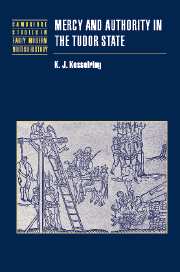Book contents
- Frontmatter
- Contents
- Acknowledgments
- Abbreviations and conventions
- 1 Introduction: mercy and the state
- 2 Changing approaches to punishment and mitigation
- 3 Changing approaches to the pardon
- 4 Patronage, petitions, and the motives for mercy
- 5 Public performances of pardon
- 6 Protest and pardons
- 7 Conclusion
- Appendix I Sources
- Appendix II Benefit of the belly
- Bibliography
- Index
- Titles in the series
4 - Patronage, petitions, and the motives for mercy
Published online by Cambridge University Press: 05 July 2009
- Frontmatter
- Contents
- Acknowledgments
- Abbreviations and conventions
- 1 Introduction: mercy and the state
- 2 Changing approaches to punishment and mitigation
- 3 Changing approaches to the pardon
- 4 Patronage, petitions, and the motives for mercy
- 5 Public performances of pardon
- 6 Protest and pardons
- 7 Conclusion
- Appendix I Sources
- Appendix II Benefit of the belly
- Bibliography
- Index
- Titles in the series
Summary
The Tudors granted their pardons from a variety of motives and pretexts, to serve ends both implicit and explicit. Some they used to celebrate new beginnings; others they issued as tokens of gratitude. The Tudors employed pardons to present themselves as God's merciful justiciars and to help cement the allegiance of the governing elite. Pardons encouraged widespread complicity in the increasingly bloody system of justice that characterized the early modern state. Janus-like, they selected some to live and thereby sanctioned the death of others. But why, specifically, did some offenders receive pardon and others not? The necessity of conforming to widely shared perceptions of justice and mercy ensured that some would obtain pardon, but on what grounds did the Tudors choose the individual recipients of their grace?
This chapter turns from the abstractions and macro-processes of state formation to look more closely at individual experiences of authority. It first examines the official correspondence surrounding pardons, petitions for mercy, and the pardons themselves to delineate the various characteristics of offenses and offenders that shaped these decisions. Some pardons freed the wrongly convicted, while others issued automatically from Chancery for crimes that the law deemed excusable; most pardons, however, remained gifts of royal grace, recognizing varying degrees of culpability, penitence, and potential for reform. The chapter then explores the processes through which petitioners sought, and sovereigns granted, remission.
- Type
- Chapter
- Information
- Mercy and Authority in the Tudor State , pp. 91 - 135Publisher: Cambridge University PressPrint publication year: 2003



